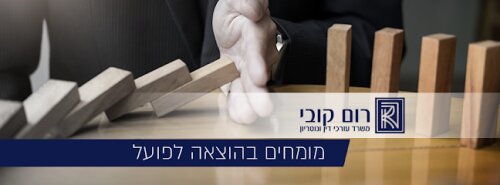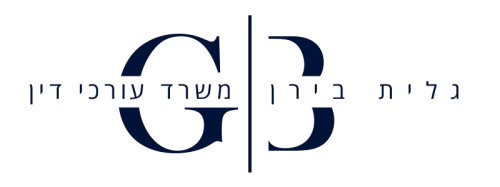Best ADR Mediation & Arbitration Lawyers in Ramat Gan
Share your needs with us, get contacted by law firms.
Free. Takes 2 min.
List of the best lawyers in Ramat Gan, Israel
About ADR Mediation & Arbitration Law in Ramat Gan, Israel
Alternative Dispute Resolution, commonly known as ADR, encompasses various methods for resolving legal disputes outside of court, with mediation and arbitration being the two most prominent forms. In Ramat Gan, Israel, ADR has become a popular means for individuals and businesses to resolve civil, commercial, and even some family disputes quickly, privately, and cost-effectively. By choosing mediation or arbitration, parties often save time and resources while maintaining greater control over the outcome. Local professionals and institutions specializing in ADR offer structured processes, guided by experienced mediators or arbitrators, aiming for fair and efficient resolutions.
Why You May Need a Lawyer
Although ADR processes are designed to be accessible and less formal than traditional courts, the assistance of a legal professional can be invaluable. Here are some common situations where engaging a lawyer is highly recommended:
- Drafting or reviewing mediation or arbitration agreements to ensure your rights are protected
- Representing your interests during complex negotiations or hearings
- Advising you on the legal implications and enforceability of ADR outcomes
- Interpreting local laws and procedural rules specific to Ramat Gan and Israel
- Preparing or responding to submissions and evidence in arbitration cases
- Ensuring fair conduct in cases involving power imbalances or sensitive issues
- Assisting in cross-border disputes involving international parties
Local Laws Overview
Israel recognizes and supports the use of ADR, particularly through the Arbitration Law of 1968 and the Courts Law, which provide the legal framework for mediation and arbitration across the country, including Ramat Gan. Mediation is frequently encouraged by the courts for civil cases, and arbitration agreements are legally binding if properly executed. Key points to note include:
- Court referral to mediation is common, but voluntary participation is still essential
- Arbitrators in Israel are typically chosen by the parties or appointed by the court in some instances
- Arbitration awards can often be enforced through the courts if necessary
- Certain disputes, such as some family matters or criminal cases, may not be eligible for ADR
- Confidentiality is generally maintained in both mediation and arbitration processes
- Local mediators and arbitrators are required to adhere to ethical standards as set by professional associations and relevant law
Legal professionals in Ramat Gan are well-versed in these statutes and the unique policies of local courts, helping clients navigate the system effectively.
Frequently Asked Questions
What is the difference between mediation and arbitration?
Mediation involves a neutral third party who helps disputing parties reach a voluntary, mutually acceptable agreement. Arbitration, by contrast, is more formal, where the arbitrator hears arguments and evidence, then makes a binding decision.
Is ADR legally recognized and enforceable in Ramat Gan, Israel?
Yes, both mediation agreements and arbitration awards are legally recognized and can be enforced according to Israeli law, provided proper procedures are followed.
When should I consider using mediation or arbitration?
Mediation and arbitration are suitable for a wide range of civil, commercial, and contractual disputes. Consider ADR when you want a faster, confidential, and potentially less adversarial resolution compared to court litigation.
Are ADR outcomes confidential?
Yes, confidentiality is a hallmark of both mediation and arbitration in Israel, unless the parties agree otherwise or the court orders disclosure in special circumstances.
Do I need a lawyer to participate in mediation or arbitration?
While not strictly required, having legal representation can help protect your interests, ensure compliance with the law, and increase the likelihood of achieving a favorable result.
How are mediators and arbitrators chosen in Ramat Gan?
Parties can agree on a mediator or arbitrator, often selecting from professional lists or organizations. If no agreement is reached, a court or ADR institution might appoint one.
What happens if one party refuses to comply with an arbitration award?
If a party fails to comply with a legally binding arbitration award, the other party can apply to the court for enforcement, which is generally straightforward under Israeli law.
Can I appeal the outcome of mediation or arbitration?
Mediation outcomes, being voluntary agreements, cannot typically be appealed. Arbitration awards can rarely be appealed unless there was a significant error of law, misconduct, or agreement violation.
What types of disputes can be resolved through ADR in Ramat Gan?
Most civil and commercial disputes, including business disagreements, property issues, contracts, and sometimes employment or family-related matters, can be handled through ADR. Criminal and some family law cases are generally excluded.
How long does the ADR process typically take?
ADR processes are usually much faster than court litigation. Mediation can often resolve disputes in a few sessions, while arbitration may take several weeks or months, depending on complexity.
Additional Resources
If you want to learn more or need support regarding ADR Mediation and Arbitration in Ramat Gan, consider the following resources:
- The Israel Bar Association - provides lists of certified mediators and arbitrators
- Local Ramat Gan legal aid clinics - offer initial consultation and guidance
- The Ministry of Justice - publishes information on mediation and arbitration procedures
- Israeli Center for Mediation and Conflict Resolution - professional association for mediators
- Chamber of Commerce in Ramat Gan - often provides dispute resolution services for business matters
Next Steps
If you believe ADR mediation or arbitration could help resolve your legal issue, consider taking the following steps:
- Consult with a qualified lawyer in Ramat Gan who specializes in ADR to assess your situation
- Gather all relevant documents, agreements, and communication related to your dispute
- Discuss your options with the other party if possible, and express your interest in ADR processes
- Choose a reputable mediator or arbitrator, potentially with the guidance of your legal advisor
- Prepare for the process by understanding your objectives and desired outcomes
- Stay informed about your rights and the applicable local laws
Legal professionals can guide you through each stage, ensuring that your interests are protected and that the ADR process proceeds smoothly and effectively.
Lawzana helps you find the best lawyers and law firms in Ramat Gan through a curated and pre-screened list of qualified legal professionals. Our platform offers rankings and detailed profiles of attorneys and law firms, allowing you to compare based on practice areas, including ADR Mediation & Arbitration , experience, and client feedback.
Each profile includes a description of the firm's areas of practice, client reviews, team members and partners, year of establishment, spoken languages, office locations, contact information, social media presence, and any published articles or resources. Most firms on our platform speak English and are experienced in both local and international legal matters.
Get a quote from top-rated law firms in Ramat Gan, Israel — quickly, securely, and without unnecessary hassle.
Disclaimer:
The information provided on this page is for general informational purposes only and does not constitute legal advice. While we strive to ensure the accuracy and relevance of the content, legal information may change over time, and interpretations of the law can vary. You should always consult with a qualified legal professional for advice specific to your situation.
We disclaim all liability for actions taken or not taken based on the content of this page. If you believe any information is incorrect or outdated, please contact us, and we will review and update it where appropriate.














